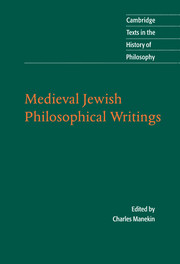Book contents
- Frontmatter
- Contents
- Introduction
- Chronology
- Further reading
- Note on the texts and translations
- 1 Saadia Gaon, from The Book of the Beliefs and Convictions
- 2 Solomon ibn Gabirol and Shem Tov b. Joseph Falaquera, Excerpts from “The Source of Life”
- 3 Moses Maimonides, from The Guide of the Perplexed
- 4 Isaac Albalag, from The Emendation of the “Opinions”
- 5 Moses of Narbonne (Narboni), The Treatise on Choice
- 6 Levi Gersonides, from The Wars of the Lord
- 7 Ḥasdai Crescas, from The Light of the Lord Treatise Two
- 8 Joseph Albo, from The Book of Principles
- Index
- CAMBRIDGE TEXTS IN THE HISTORY OF PHILOSOPHY
8 - Joseph Albo, from The Book of Principles
Published online by Cambridge University Press: 05 June 2012
- Frontmatter
- Contents
- Introduction
- Chronology
- Further reading
- Note on the texts and translations
- 1 Saadia Gaon, from The Book of the Beliefs and Convictions
- 2 Solomon ibn Gabirol and Shem Tov b. Joseph Falaquera, Excerpts from “The Source of Life”
- 3 Moses Maimonides, from The Guide of the Perplexed
- 4 Isaac Albalag, from The Emendation of the “Opinions”
- 5 Moses of Narbonne (Narboni), The Treatise on Choice
- 6 Levi Gersonides, from The Wars of the Lord
- 7 Ḥasdai Crescas, from The Light of the Lord Treatise Two
- 8 Joseph Albo, from The Book of Principles
- Index
- CAMBRIDGE TEXTS IN THE HISTORY OF PHILOSOPHY
Summary
Treatise One
Wherein is treated the number of laws, and wherein it is shown that they are three: natural, conventional, and divine. The differences between them are given, and the principles of every one of them investigated, so that the principles of the divine law are made clear. Then is explained the test whereby the divine law is distinguished from the spurious law that pretends to be divine, and whether there can be more than one divine law at a time.
[Chapters One through Three are omitted] Chapter Four
I consider the proper way to enumerate the principles that are the roots and fundamentals of the divine Torah to be as follows:
The necessary and inclusive principles of the divine law are three: the existence of God, providence in reward and punishment, and Torah from heaven. These three are the primary categories of the various divine laws, such as the Torah of Adam, the Torah of Noah, the Torah of Abraham, the Torah of Moses, and any other divine Torahs, if there be such, at the same time or in succession. There are subordinate and derivative principles included in every one of these three Torahs, which issue from the principle as a branch issues from a tree. Thus, God's eternity, perpetuity, and so on are subsumed under the existence of God. God's knowledge, prophecy, and so on are included within Torah from heaven. Reward and punishment in this world, and spiritual in the next are included within providence.
- Type
- Chapter
- Information
- Medieval Jewish Philosophical Writings , pp. 236 - 252Publisher: Cambridge University PressPrint publication year: 2008

